Parents across Ontario and New Brunswick—and increasingly in other provinces—are facing growing pressure to comply with school vaccination policies. Many have reported receiving suspension notices and being told that their children could be excluded from school if vaccination records or exemption forms are not submitted.
These actions have raised serious concerns about charter rights, parental rights, informed consent, medical privacy, and access to education. They have also raised questions about the sincerity of Public Health staff’s concerns for the actual health and wellbeing of our children.
What many parents don’t realize is:
In 1996, Health Canada’s National Report on Immunization explicitly stated that mandatory vaccination was barred under Canadian law.
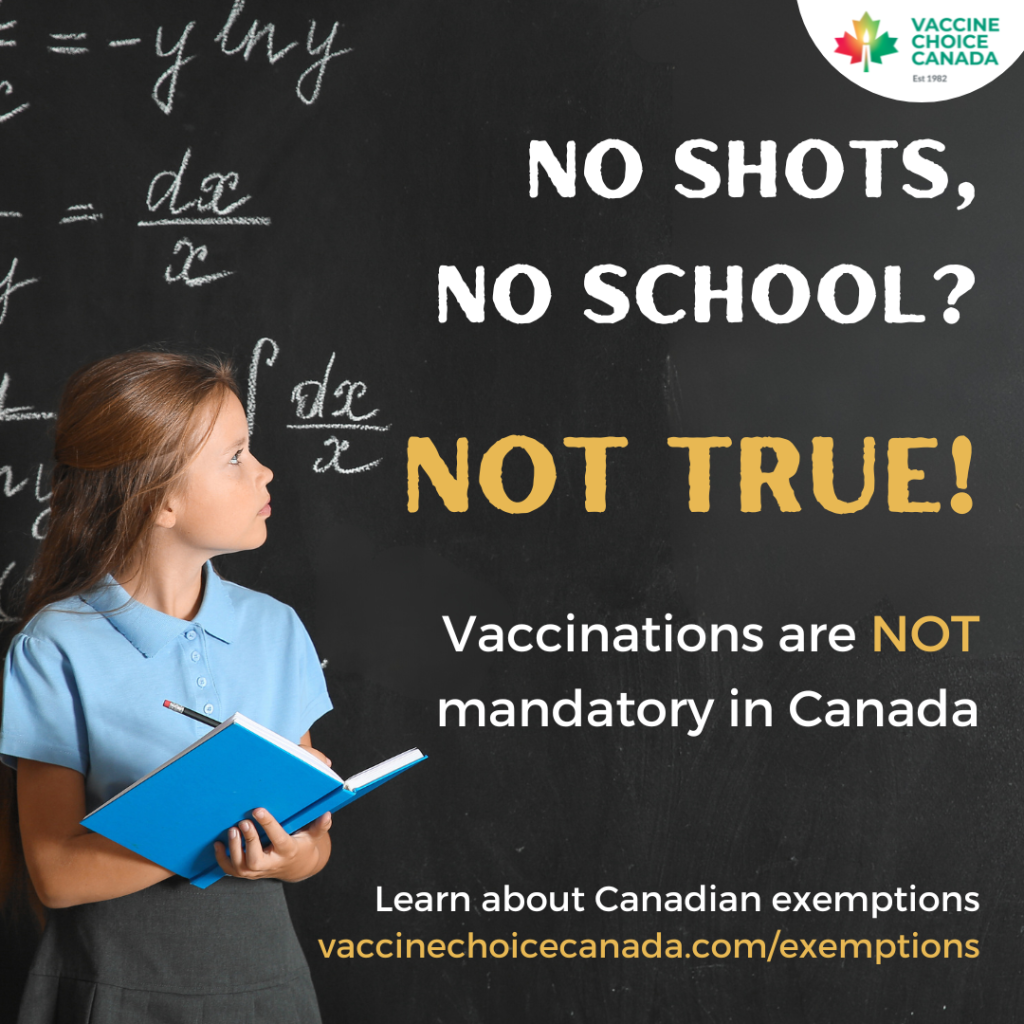
* Legally true, but not necessarily in practice across provinces.
“Unlike some countries, immunization is not mandatory in Canada; it cannot be made mandatory because of the Canadian Constitution.”
There are currently two provinces with legislation that attempt to mandate vaccination of children as a condition for attending school – Ontario and New Brunswick. British Columbia has a Vaccination Status Reporting Regulation, but does not require vaccination. The remaining provinces and territories do not have legislation requiring vaccination for school attendance.
QUICK LINKS:
It is critical that you know your rights. You have the right to choose all, some, or no vaccines. The decision belongs to the parents. By knowing your legal right to refuse vaccines and exercising your right to informed consent and protection of privacy, you and your children are less vulnerable to coercion by school and public health officials.
Governments, school personnel, and the media regularly communicate the misconception of mandatory vaccine requirements, and often omit information about the need for informed consent, and the availability of vaccine exemptions.
Canadian Medical Law clearly states that healthcare recipients must be informed of all significant risks posed by any invasive medical procedure that carries a risk of injury or death. Vaccination is such a procedure; every Canadian must have received and understood all the information that is pertinent to the vaccination(s) to which they consent.
Informed consent is defined differently by province in provincial acts. Under Ontario’s Health Care Consent Act, 1996, consent to treatment must meet the following criteria:
1. The consent must relate to the treatment.
2. The consent must be informed.
3. The consent must be given voluntarily.
4. The consent must not be obtained through misrepresentation or fraud.


All Canadians have a Constitutionally protected right to refuse any and all medical treatments, including vaccines.
Section 7 of the Canadian Charter of Rights and Freedoms states: “Everyone has the right to life, liberty and security of the person and the right not to be deprived thereof except in accordance with the principles of fundamental justice.”
The Public Health Agency of Canada, in 1996, stated: “Unlike some countries, immunization is not mandatory in Canada; it cannot be made mandatory because of the Canadian Constitution.”
VCC’s Position
The Ontario exemption process is not being applied consistently and fairly across the Province and is subject to the whims of the principal and public health officer for a given school or region. In addition, suspensions are being used inappropriately as instruments of coercion and duress which violates our Charter rights and the medical ethic of informed consent.
A number of public health officers and school districts are using deception and coercion to impose vaccination by withholding essential information from parents, specifically their legal right to file a statement of exemption based on conscience or religious belief.
Health agents, in conjunction with school boards and principals, have threatened and carried out the expulsion of thousands of children in Ontario. The use of threats and expulsion is being used as a means to impose vaccination by coercion rather than consent. This is a violation of the medical ethic of informed consent.
Suspensions do not change the vaccination status of the child so any presumed argument that a 20 day suspension is for the safety of other children is without merit. It is also worth noting that the adults in the schools – teachers, administrators, and support staff are not required to show proof of vaccination.
According to Ontario’s Immunization of School Pupils Act, a student may be suspended from school for a period of 20 days for not providing proof of immunizations or a statement of exemption.
http://www.e-laws.gov.on.ca/html/statutes/english/elaws_statutes_90i01_e.htm
In Ontario, there are two types of exemptions for school-aged children: a non-medical exemption (for philosophical/conscience belief) and a medical exemption.
The Covid-19 vaccine is not currently required under Ontario’s Immunization of Schools Pupils Act or the New Brunswick Public Health Act.
Students who have not received a COVID-19 vaccine do not require an exemption.
Ontario’s vaccination program for children is dictated by the terms of the Immunization of School Pupils Act under the Ministry of Health, and the Child and Early Years Act (2014) under the Ministry of Education.
Designated diseases covered under the Act are diphtheria, tetanus, poliomyelitis, pertussis, measles, mumps, rubella, meningococcal, and varicella.
English: https://www.ontario.ca/laws/regulation/900645
French: https://www.ontario.ca/fr/lois/reglement/900645
Protection of privacy and informed consent are dictated by the following provincial acts:
Legal exemption forms are available on the website of the Government of Ontario Central Forms Repository.
Important note: all PDF forms on the Central Forms Repository (CFR) require Adobe Reader 8 or higher. In order to view these forms, you will need to update Adobe Reader to the latest version.
There are two types of exemptions for school-aged children: a Medical Exemption and Non-Medical Exemption (for philosophical/conscience belief).
A physician or nurse practitioner must complete a Statement of Medical Exemption for children who require a medical exemption from vaccine requirements under the Immunization of School Pupils Act.
Statement of Medical Exemption
A parent must complete a Statement of Conscience or Religious Belief and have it witnessed by a commissioner for taking affidavits if they wish to obtain a non-medical exemption for their child from vaccine requirements under the Immunization of School Pupils Act.
Statement of Conscience or Religious Belief (School Pupils Act)
Exemptions are available for children attending daycare centres, as well as for employees, owners, and family members of home-based daycare centres.
There are different exemption forms – one for Individuals and one for Parents of a child attending daycare. When the PDF opens, you can “Choose your status” as “Parent of a child” or “Individual”
Statement of Conscience or Religious Belief – Page 1 – English

Statement of Conscience or Religious Belief – Page 2 – English
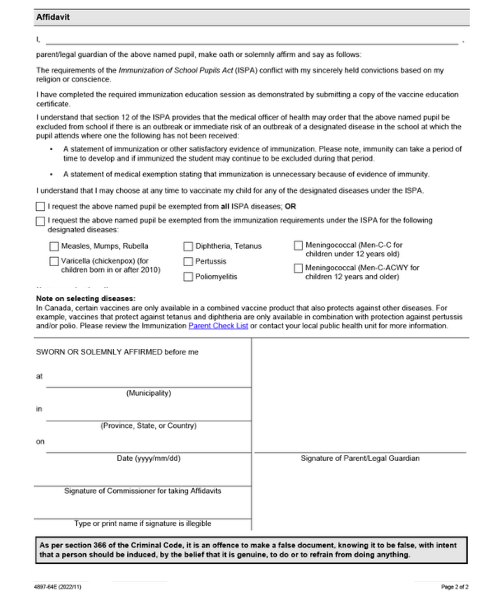
Déclaration de conscience ou de croyance religieuse
Page 1 – French
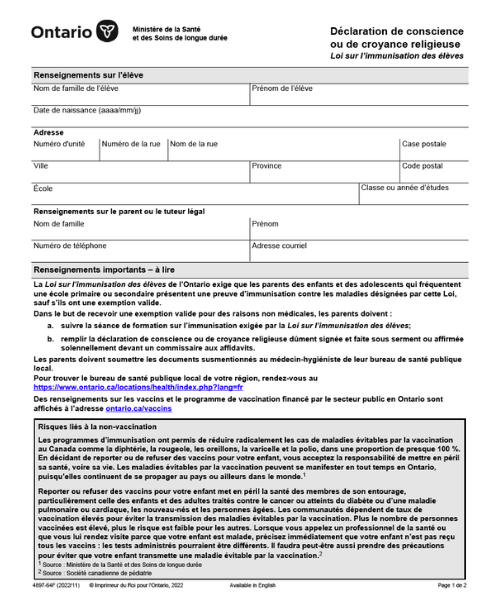
Déclaration de conscience ou de croyance religieuse
Page 2 – French
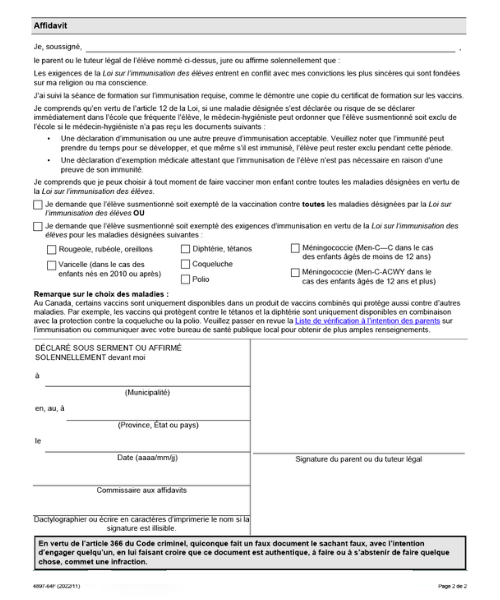
There are two types of exemptions for children in preschool or child care: a Medical Exemption and Non-Medical Exemption (for philosophical/conscience belief).
A physician or nurse practitioner must complete a Statement of Medical Exemption for children in preschool or child care centres who require a medical exemption from vaccine requirements.
Statement of Medical Exemption
A parent must complete a Statement of Conscience or Religious Belief and have it witnessed by a commissioner for taking affidavits if they wish to obtain a non-medical exemption for their child from vaccine requirements.
Statement of Conscience or Religious Belief (Child Care and Early Years Act)
The Ontario Ministry of Health requires all parents/guardians of students wishing to obtain a non-medical exemption to complete a vaccine education session and receive a vaccine education certificate. A notarized Statement of Conscience or Religious Belief form must be submitted to Public Health before the exemption can be applied to your child’s record.
Steps:
1. Complete the Ontario Ministry of Health’s online vaccine education session by watching the Vaccine Education Video.
Vaccine Education Video – English
Vidéo éducative sur les vaccins – French
2. Notify Public Health that you’ve completed the Ontario Ministry of Health’s video education session.
Important note: Each region may have different steps for completing the video education session. Contact your local health unit for information on the “vaccine education sessions” in your area.
3. Print and complete the Statement of Conscience or Religious Belief form for school-aged children.
English: https://forms.mgcs.gov.on.ca/en/dataset/014-4897-64
French: https://forms.mgcs.gov.on.ca/fr/dataset/014-4897-64
4. Take the completed Statement of Conscience or Religious Belief form to a Commissioner for taking affidavits to have it notarized. Keep a copy of the commissioned Affidavit for your records.
Commissioner of Oaths
A Commissioner of Oaths is a person authorized to take your oath in person when you sign the legal affidavit, stating that you are signing the form for your child for the purpose for which the form is intended.
Commissioners of Oaths are:
• Municipal Clerks or Deputy Clerks for your local municipality
• Members of the Provincial Government (MPPs)
• Provincial Judges
• Justices of the Peace
• Barristers or Solicitors licensed to practice law in Ontario
• Licensed Paralegals
• A notary Public
• Some staff at Service Ontario Government Information Centres (some of these commissioners may choose not to sign exemption forms).
There may be a cost to have the form signed and photo ID will be required.
Ontario Ministry of Health – Public Health Unit Locator:
Many concerns have been raised with the wording on the Statement of Conscience or Religious Belief form and are reluctant to sign the Affidavit. The Affidavit makes inaccurate claims about the efficacy of vaccines based on research and information available at Vaccine Choice Canada. Similarly, the wording makes inaccurate claims about the risk of not vaccinating your child.
It also states, “With the decision to delay or refuse vaccines, you are accepting responsibility that you are putting your child’s health and even life at risk.”
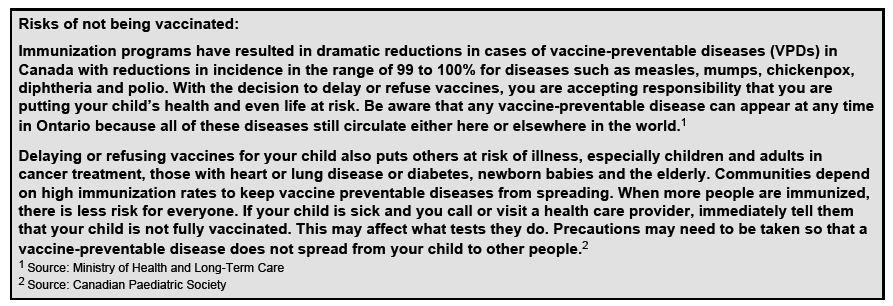
Parents who disagree with the “Risk” statement are put in a position of signing incriminating and false information, in that it forces them to acknowledge, under oath, that they are knowingly putting their child’s health and the lives of others at risk.
Some parents simply cross out the self-incriminating section, initialize and date the change. This has resulted in some forms being accepted in some school districts and others being rejected.
One legal opinion noted that this might cause the paperwork to be rejected, as the public health office may refuse to accept forms that have been altered.
https://www.niagararegion.ca/health/vaccinations/children/school-exemption.aspx
There are many options for parents who want to send their child to an Ontario school without providing their children’s private medical records to Public Health.
The success of these measures varies considerably across schools, principals and public health districts.
Some parents decide to sign the affidavit as is and view the video. Once that’s done, they send their children to school without any problems.
Some parents have crossed out the self-incriminating section. Initially, Public Health refused to accept the revised affidavit, claiming parents cannot alter the prescribed document. Parents argued that it’s illegal to swear a false affidavit if they disagree with the self-incriminating section.
Disclaimer: If you have concerns about signing the Affidavit, it is advisable to consult with a legal professional.
If a parent receives a suspension notice from Public Health or school, they may politely contact the principal, (the only person that has the authority to legally suspend a student) and request the suspension be provided in writing, including:
If the principal cannot provide you, in writing, which act and which section of that act they are using to suspend your child, the suspension is unlawful and cannot be enforced.
Parents can file an appeal through the Health Service Appeal and Review Board tribunal. The process is easy, quick, and the entire process is completely done online.
Many parents simply ignore the suspension and continue sending their kids to schools. Some parents have reported that their child was isolated in the principal’s office or another room for the entire day and may or may not recess at a time when other students are not outside.
Some parents choose to remove their child from school and initiate homeschooling or other education alternatives.
Suggested Resource: I’m Unvaccinated and That’s Okay by Shannon Kroner
For more information about this process, download Christine Colebeck’s guide “How to Get a Vaccine Exemption in Ontario for School Attendance”
By Christine Colebeck
The following information is to assist parents in Ontario effectively navigate the Immunization of School Pupils Act, an act that compels parents to either have their children receive any and all recommended vaccines, or complete an affidavit and other measures as prescribed by the Government of Ontario in order for their children to attend school.

Christine Colebeck has been helping Ontario parents navigate the vaccine exemption process for school children for over 2 decades. Topics include:
1) A brief history of the Ontario Immunization of School Pupils Act (ISPA) legislation.
2) The ISPA exemption process and changes in 2017 regarding the self-incriminating affidavit.
3) Your legal rights regarding protected, conscience/religious exemptions and your privacy.
https://librti.com/view-video/ontario-children-exemption-process
Attention Ontario parents:
If your child has been unlawfully suspended from school because you chose not to disclose your child’s private medical information, you can take action.
1. Schedule an appointment with your MPP or attend as a group of concerned parents.
2. Download and print the Parent Letter to MPP.
3. Download and print a copy of the Immunization of School Pupils Act (ISPA). Remember, the ISPA does NOT override your child’s charter or education rights.
4. Confirm your MPP is open to discuss and respect the unconstitutional, unlawful denial of education and privacy rights of children.
5. Explain fully the documents to the MPP and that there is momentum among Ontario parents to secure their children’s educational and medical privacy rights.
6. Obtain a commitment from your MPP to support your children’s guaranteed education, privacy and charter rights.
See the Letter to Public Health Officers, School Administrators, Superintendents, and School Trustees regarding the protection of parental rights and informed consent.
The legislative authority for the New Brunswick Immunization Program is provided by the Public Health Act and Regulation 2009-136. The Education Act outlines the legislative framework for the province’s education system.
See sections 12(1) 12(2) and 12(3) in the Public Health Act and the Reporting and Diseases Regulation 2009-136 – Immunization of Children.
English: https://laws.gnb.ca/en/document/cr/2009-136
French: https://laws.gnb.ca/fr/document/rc/2009-136
See sections 10(1) & 10(2) can be found under the Acts and Regulations.
English: https://laws.gnb.ca/en/document/cs/E-1.12
French: https://laws.gnb.ca/fr/document/lc/E-1.12
The Department of Education’s Policy 706, outlines Education’s role in Required Immunization.
English: https://www2.gnb.ca/content/dam/gnb/Departments/ed/pdf/K12/policies-politiques/e/706A.pdf
French: https://www2.gnb.ca/content/dam/gnb/Departments/ed/pdf/K12/policies-politiques/f/706F.pdf
In New Brunswick, immunization exemptions for school-aged children are permitted for medical reasons or if the parent or legal guardian objects to immunization.
Immunization Exemption Form for School Entry
Formulaire d’exemption à l’immunisation pour l’entrée à l’école
French
In New Brunswick, immunization exemptions for children in day care are permitted for medical reasons or if the parent or legal guardian objects to immunization.
Immunization Exemption Form for Day Care
English: https://www2.gnb.ca/content/dam/gnb/Departments/h-s/pdf/en/CDC/HealthProfessionals/413-ImmunzationExceptionforDayCare.pdf
French: https://www2.gnb.ca/content/dam/gnb/Departments/h-s/pdf/fr/MaladiesTransmissibles/ProfessionnelsEnSantePublique/413-FormulaireDeDispenseDimmunisationPourLesGarderies.pdf
Formulaire De Dispense Dimmunisation Pour Les Garderies
French
The B.C. Government approved the Vaccination Status Reporting Regulation (VSRR), which came into force on July 1, 2019, allowing the Medical health officer (MHO) to require a parents/guardian to report the vaccination status of their school-age children.
The Vaccination Status Reporting Regulation applies to all students (kindergarten to grade 12) in all schools (public or private), including those who are home-schooled. It does not apply to children attending schools in First Nations communities.
MHO may require that reasons for non-vaccination (medical contraindication and intention not to vaccinate the child including the reason) be documented, signed and dated, and submitted to the MHO, by the health care provider or the parent/guardian, respectively.
Two forms have been developed to support such documentation, although other written means of submitting these statements are permissible if they meet the requirements of these sections.
Section 6(e)(i)
Medical Contraindication
HLTH 2370 2019/10/30
This form can ONLY be completed by a medical practitioner, a nurse practitioner, or a registered nurse-remote practice certified.
https://www2.gov.bc.ca/assets/gov/health/forms/2370fil.pdf
Section 6(e)(ii)
Intention to Not Vaccinate
HLTH 2369 2019/10/30
Parents who refuse to vaccinate their children may be requested by the Medical health officer to complete the Intention to Not Vaccinate form.
The authority for the Vaccination Status Reporting Regulation (VSRR) is provided by the Public Health Act (2008), and the specific administration and oversight varies by jurisdiction. The BCCDC (British Columbia Centre for Disease Control) is involved in the implementation and management of the VSSR. The Ministry of Health provides budgetary support for immunization programs and services. Recommended programs are based on an extensive consultative process led by the Communicable Diseases and Immunization Service (CDIS), managed by the British Columbia Centre for Disease Control (BCCDC).
(last amended June 19, 2023) https://www.bclaws.gov.bc.ca/civix/document/id/complete/statreg/146_2019
BCCDC – BC Centre for Disease Control (January 16, 2020)
Health Gateway
https://www.healthgateway.gov.bc.ca/
BCCDC – BC Centre for Disease Control
http://www.bccdc.ca/health-professionals/clinical-resources/informed-consent-for-immunization
BCCDC – BC Centre for Disease Control
Chapter 2: Immunization
Appendix A – Informed Consent for Immunization
The B.C. Government launched a “measles immunization catch-up program”, which ran from April to the end of June 2019. The goal of the campaign was to vaccinate all school-aged children (kindergarten to Grade 12) who had not previously been vaccinated against measles or had not received both recommended doses.
Source:

During the Catch-Up program, health authorities held 1,053 in-school clinics, as well as 3,484 public health clinics in communities across B.C. 590,748 students from kindergarten to Grade 12 had their immunization records reviewed and parents and guardians of children with missing or incomplete records were notified.
In July 2019, the Province implemented the mandatory reporting of student’s immunization status through the Vaccination Status Reporting Regulation.
“Starting this school year, parents and guardians will be expected to provide immunization status of their children to their local public health unit.”
Adrian Dix, Minister of Health of British Columbia (June 29, 2019)
Mandatory vaccine reporting on the way for B.C. parents
CBC News, February 22, 2019
Dr. Henry said that while the process is yet to be determined in detail, she expects there will be some exemptions —including medical reasons or personal beliefs — that will require a notarized form to be submitted that outlines parents understand the potential consequences of their child not being immunized.
What parents need to know about the upcoming vaccination registry in B.C.
CBC News, February 28, 2019
B.C.’s provincial health officer is working with experts from the Ministry of Health and the B.C. Centre for Disease Control and other stakeholders on fine-tuning the details of a mandatory immunization program to be rolled out at the beginning of the next school year. Dr. Bonnie Henry says mandatory reporting will affect all students across B.C.
Province launching measles immunization program in B.C. schools
CBC News, March 20, 2019
The provincial health ministry announced Wednesday they are launching a catch-up immunization program in April to ensure more B.C. children are protected from measles. The program will run until June and will help parents prepare for September, when reporting of vaccination status for school children will be mandatory. Regional health authorities will deliver the program. Public health nurses will be going into schools to offer immunization for children from kindergarten to Grade 12.
Parents of unvaccinated B.C. children must speak to health staff under new reporting program: ministry
CBC News, August 29, 2019
https://www.cbc.ca/news/canada/british-columbia/measles-vaccine-bc-mandatory-reporting-program-for-students-1.5263969
Parents who choose not to vaccinate their school-age children in B.C. or who don’t provide children’s health records will be required to speak with public health staff as part of a new, mandatory immunization reporting program beginning this fall, according to the education ministry.
The B.C. government has been very explicit in their agenda to vaccinate children without the consent of parents. On page 2 of the Non-Vaccination Statement form, they state:

The Mature Minor Doctrine was introduced to various health care acts to permit adolescents to access birth control devices and abortion services without the knowledge or consent of their parents. It was never intended as a tool to avoid the consent of parents in making vaccination decisions. Today, the Mature Minor Doctrine is commonly utilized in school-based vaccination clinics to vaccinate children, often without the knowledge or consent of the parent/guardian.
A child who is a mature minor may make their own health care decisions independent of their parents’ or guardians’ wishes.
In British Columbia, there is no set age when a child is considered capable to give consent.
Read more: The Mature Minor Doctrine in Canada
An increasing number of vaccination clinics are being held in schools and children are being vaccinated at school without the knowledge or consent of their parents.
Here’s an example of how a public health nurse obtains informed consent from a mature minor in a school setting.
ImmunizeBC: Mature Minor Informed Consent Grade 9
In B.C., vaccines for school-aged children are routinely given in grade 6 and grade 9. Most of the time, the vaccines are given by nurses at vaccination clinics held at schools. A child can consent to the vaccine on their own behalf if the health care provider has determined that the child is capable of making this decision.
VCC’s Position
VCC defends the right and responsibility of parents to make decisions for their minor children under the age of consent (18 years). We believe that policies such as the Mature Minor Doctrine undermine parental authority and subjects children to unacceptable coercion from school administrators and teachers, public health authorities, and peer pressure. It is the position of VCC that vaccine clinics do not belong in our schools.
Vaccination is too complex a medical decision to permit minor children to consent without the guidance of their parents or legal guardians. Public health nurses administering vaccinations in schools do not have sufficient knowledge of the child’s medical or family history to be administering these life altering medications to children without parental knowledge and consent.
Consent for School Immunization forms are being sent home with the student whenever there is a vaccine clinic at school.
“Parents or guardians and their children are encouraged to review the information, discuss it, and make a decision about immunization together. This can be used as an opportunity for adolescents to start making decisions about their own health. Adolescents will have the opportunity to make their own decision to be immunized whether or not they have a consent form signed by a parent or guardian.”
source: https://www.healthlinkbc.ca/healthlinkbc-files/infants-act-mature-minor-consent-and-immunization
Consent for School Immunizations
with mature minor consent
HLTH 2398 2023/11/07
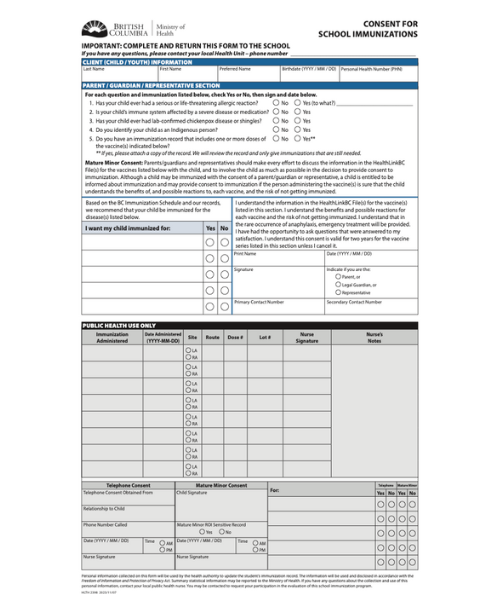
Consent for School Immunizations
no mature minor consent
HLTH 2397 2023/11/07

A B.C. couple are furious after public health nurses vaccinated their teenage daughter at school without parental consent. Dean Bootsma said his 14-year-old daughter was pulled out of her Grade 9 class and inoculated against tetanus, diphtheria and pertussis (whooping cough) without checking her medical history, calling him or his wife, or having them sign a consent form.
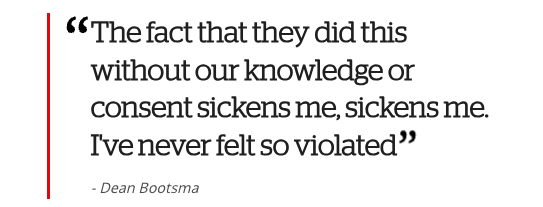
• The Mature Minor Doctrine in Canada
• Informed Consent – The Foundation of an Ethical Medical System
• Intentional Effort to Undermine Parental Rights and Responsibilities
• School Vaccination Clinics and Informed Consent
• Ontario Public Health Unit links to School Vaccination Clinic Schedules
• Ontario Lawsuit News Release – Vaccine Choice Canada October 28, 2019
• Ontario Ombudsman Complaint Lack of Informed Consent
• Ontario Teacher Responds to Professional Misconduct Verdict
• Grieving Dad Reacts to Teacher Persecution
• Ombudsman Complaint – Ontario Ministry of Health Deceiving Canadian Parents
• New Brunswick Mandates – Take Action
• New Brunswick Mandatory Vaccine Bill 39 Legal Opinion
• New Brunswick – Push for Mandatory Vaccinations For Children
• VCC Responds to Measles Hysteria
• British Columbia – An Assessment of New Mandatory Reporting Regulations
The contents of this website are for informational purposes only. Opinions expressed should not be construed as medical advice.
The particulars of any person’s concerns and circumstances should be discussed with a qualified health care practitioner prior to making any decision which may affect the health and welfare of that person or anyone under his or her care.